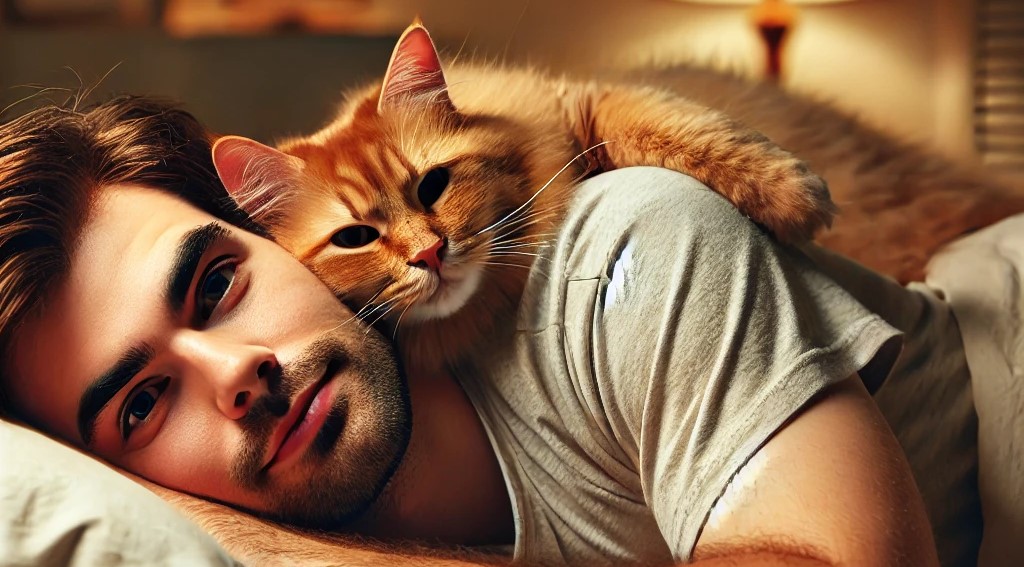Ever woken up to find your cat nestled comfortably on your head? It’s more than just a quirky habit — there’s a hidden meaning to this behavior. While felines are known for their enigmatic ways, why would they choose your noggin over the plush cat bed you lovingly bought? Surprise, surprise: studies reveal fascinating reasons behind this nocturnal preference that most pet owners are unaware of. Get ready to reconsider everything you thought you knew about your cat’s sleeping habits!
1. Cats and Their Quirky Sleep Preferences
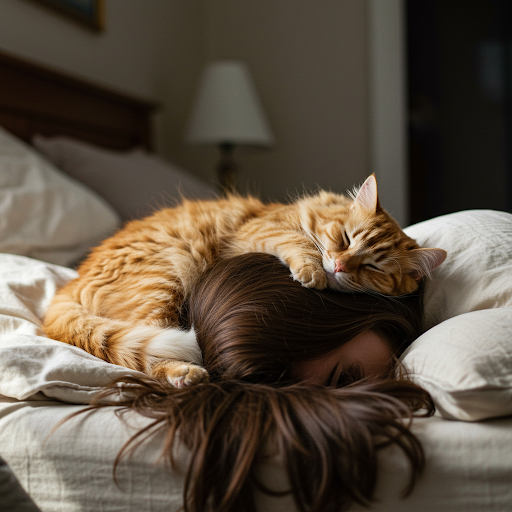
Cats are notorious for having peculiar sleeping habits. From napping in cozy boxes to curling up in random spots, their sleep preferences can be difficult to decipher. But when your feline friend chooses your head as their pillow, it’s a behavior driven by instinct and affection, aligning with their natural rhythms and the environment they crave.
2. The Comfort of Familiar Scents
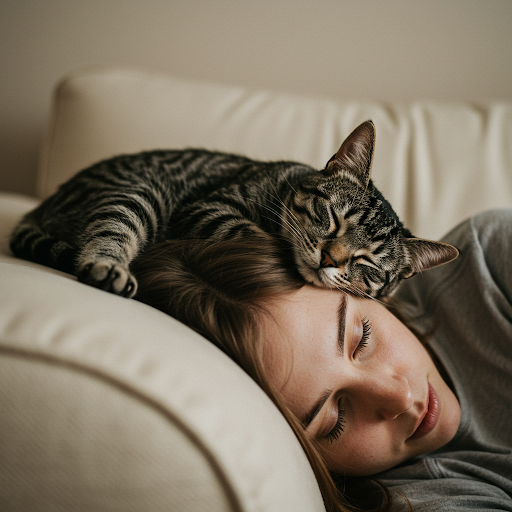
Your head is a treasure trove of scents. Cats have an extraordinary sense of smell, and they often gravitate towards familiar, comforting odors. Sleeping on your head can provide a comforting reminder each night why they’ve chosen you as their favorite human.
According to Scientific American, cats have millions more olfactory receptors than we do, helping them navigate their world through scent. So, if they’re nestling in your hair, it’s not that your last shower failed — it’s that they’re basking in your familiar aroma.
3. The Quest for Warmth
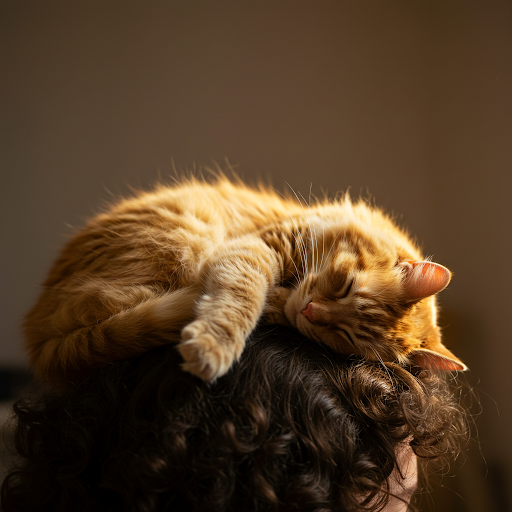
Cats love warmth. Your head, radiating heat at night, creates the perfect cozy spot for them to warm up. The average human body temperature is a toasty 98.6°F, and while your head might not technically be any warmer than other parts, it often feels like it due to heat loss. It’s like you’re offering the Ritz-Carlton of cat sleeping locales!
An investigation by NCBI has shown that warmth-seeking is an innate feline behavior, rooted in their ancestral history as desert dwellers. By curling up on your head, they’re reverting to their relic ways of snuggling up to something warm.
4. Seeking Security Through Proximity
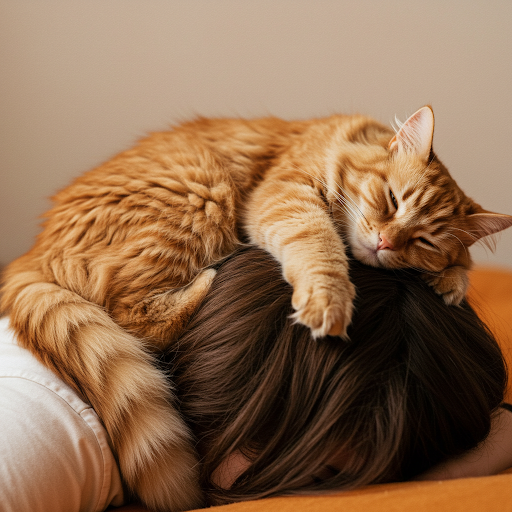
Another endearing reason your cat might sleep on your head is simply seeking security. By curling up close to you, they’re confident that nothing will happen — they can rest easy knowing their protector is always nearby. It’s a deeply trust-filled action, almost like they’re saying, ‘I trust you to keep me safe.’ So, even when your hair becomes their mattress, take it as a compliment.
Research highlighted by PubMed concludes that cats’ preference for sleeping with their humans is rooted in building social bonds through touch and proximity.
5. Cats and Sleep Territory
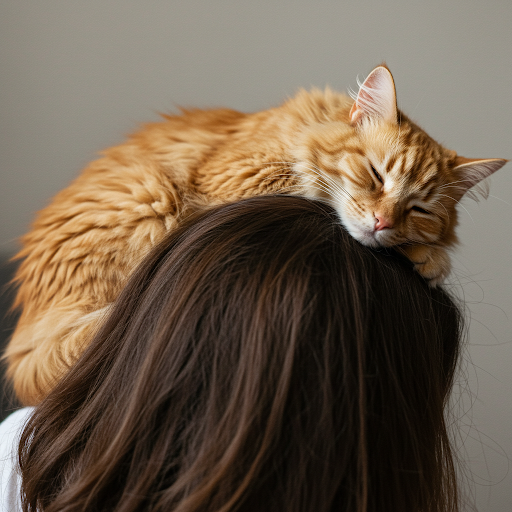
Cats are territorial creatures, and that extends to their sleep zones. They often select specific areas they can call theirs — your head might just be that sacred space. This ownership signals security to them and lets them define boundaries in their shared environment with you.
By marking your head as their sleep territory, they’re subtly communicating their affection and claim over you, much like royalty staking their land.
6. Your Head: A Higher Ground
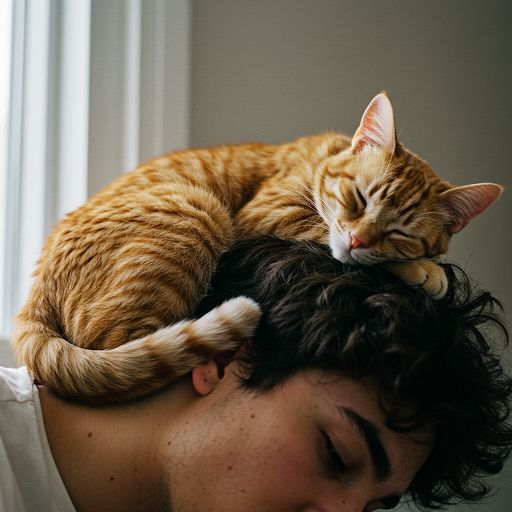
Cats adore high perches. Instinctively, heights offer them a vantage point for surveying their territory, making your head an appealing option. Perching on you equates surveying the entire ‘kingdom’ (also known as your living room), all while snuggling close!
This position speaks to their predator instincts, modeled after lions lounging on rock outcrops, commanding views of the savanna, albeit on a smaller, more domestic scale.
7. Sound Sleep in a Noisy World
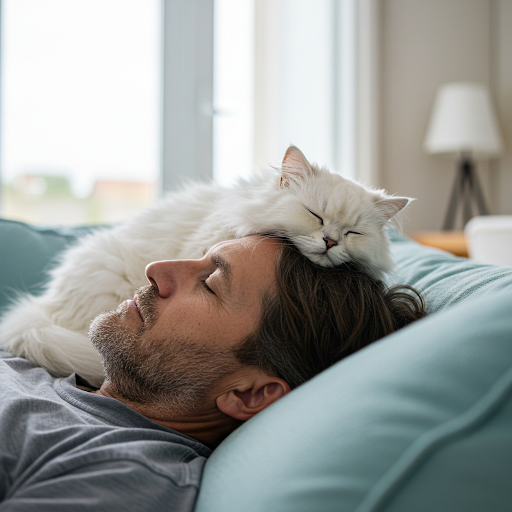
Your ears might be a comfort buffer for a sound-sensitive kitty. Cats’ acute hearing means they pick up sounds we don’t. Nestling near your head, they capitalize on your slight noise muffling effect. It’s a win-win: they get critical auditory respite, and you get endless snuggles.
As Purina suggests, cats’ ears are attuned to high-frequency sounds, sensing subtle noises that humans never notice, requiring them to find solace in cozy, quieter spots.
8. Establishing a Bond
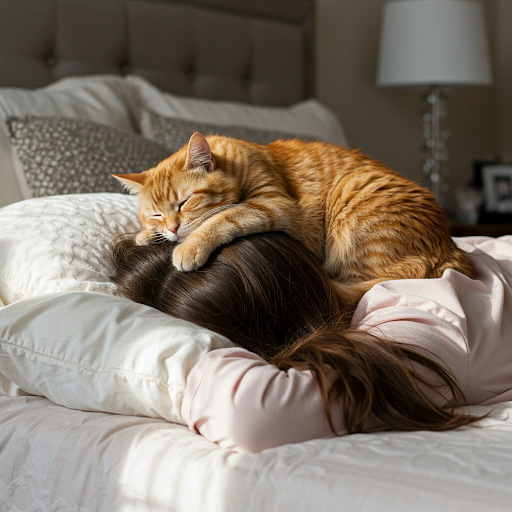
Your cat’s decision to camp on your head might be a feline way of strengthening your bond. Through a closeness ritual, they mark their attachment and regard you as part of their clan. For cats, grooming and sleeping are social activities — remember, imitation is the sincerest form of flattery, even in the animal kingdom.
9. Practical Ways to Redirect This Behavior
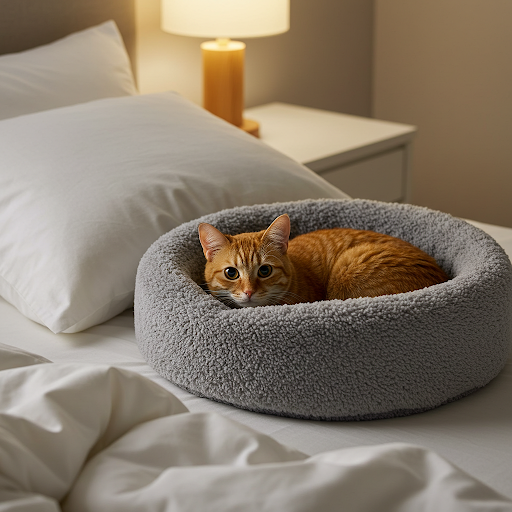
If sharing the pillow every night isn’t your ideal scenario, try redirecting your cat using practical focus points. Creating a cozy arrangement elsewhere, or a warm plushie could gently lure them away on chilly nights. Offer enticing alternatives like a heated pad or aromatic cue for your feline friend, encouraging them off your head in favor of their own soft nook.
For practical solutions, consider consulting sources like Cat Watch Newsletter to explore fixture alternatives or strategic changes in your sleeping arrangements.
10. Coexisting Harmoniously
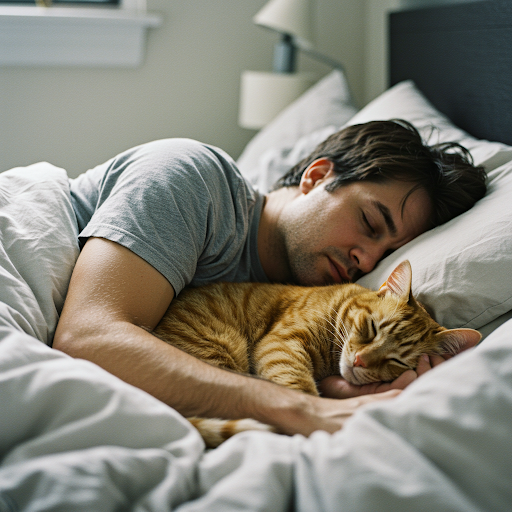
To coexist easily, accept a blend of your cat’s nightlife habits while setting boundaries for peaceful sleep cohabitation. Your cat’s preference for head sleep is not an on-off switch but an evolving adjustment needing time. Strong bonds build gradually — patience alongside warmth is your gateway to harmonizing your sleep space.
11. Benefits of Snuggling With Your Feline Friend
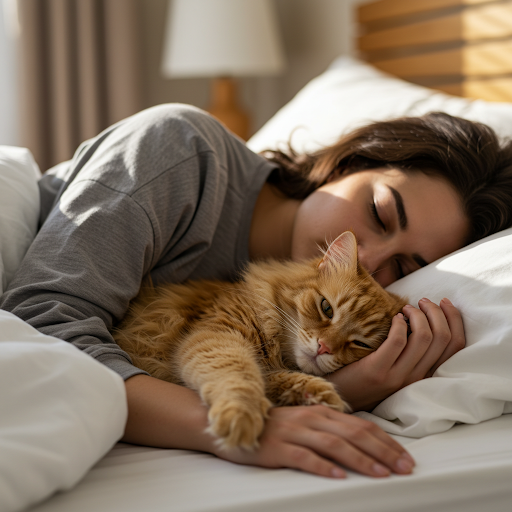
Science approves: snuggling with pets can release oxytocin, affectionately known as the ‘cuddle hormone.’ Beyond blissful warmth, it contributes significantly to stress relief and emotional well-being. Beyond relaxation, snuggling post a long weary day with your cat can be your most relatable stress-buster.
Referencing more on this biology of bonding, Psychology Today explores how animals like cats influence our mental fabric positively, meaning their sofa naps on your head might cuddle your stress away too.
12. Busting Myths: It’s Not Just About Dominance
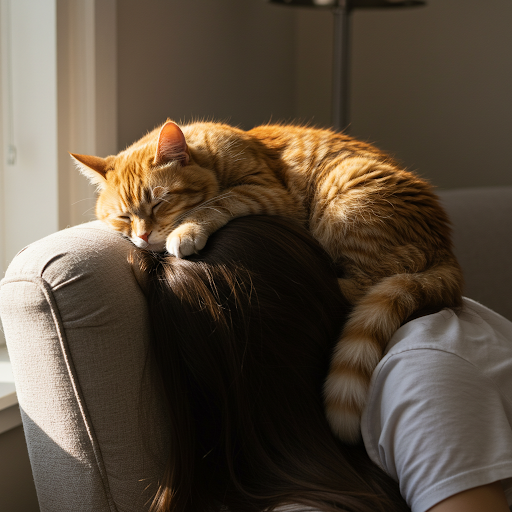
Contrary to popular belief, a cat’s choice of sleeping on their human’s head isn’t a power play. While cats have a reputation for being dominant, sleeping on your head usually reflects affection and intimacy, rather than a quest to assert control. Let’s open up the debate! Share your thoughts on what you think motivates your cat in the comments below.
Engage with recent insights from pet behaviorists on busting stereotypes, nurturing a culture of informed pet guardianship, as directed by sources like PetMD.
13. When To Be Concerned
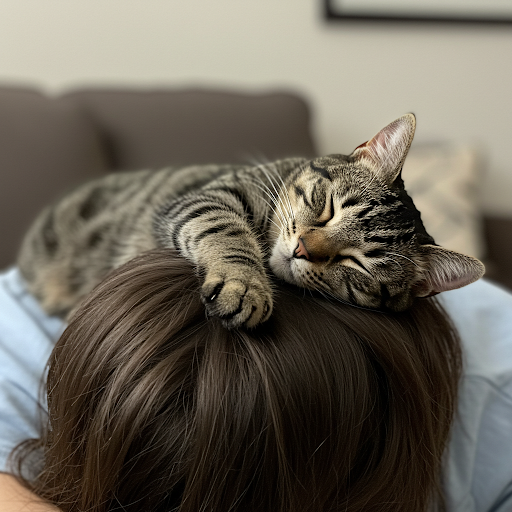
While normally sweet, changes in this behavior can signal health issues. If it becomes frequent or accompanied by other behavioral shifts, reconsider your cat’s health status. Consulting with a veterinarian is essential, ensuring your fur buddy stays healthy alongside their quirky habits.
Given advice from trusted resources, it is vital to recognize unusual signs. Benevolent behaviors can rapidly signal distress if consistent irregular patterns arise, advocating for scheduled health checkups.
14. Embrace the Mystery of Your Feline Friend
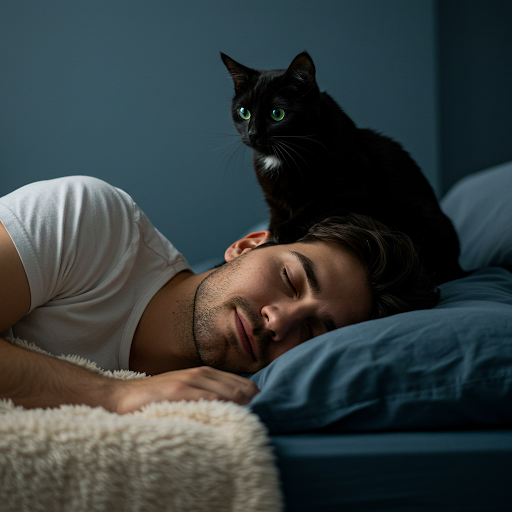
Embrace the mystery inherent to all feline friends. Their love displayed through night-time head cuddles adds layers to the enigma they wonderfully preserve. Equipped now with the knowledge behind smittens on your head, luxuriate in admiration of your sleeping companion.
15. Conclusion: Revel in Your Feline-Friendly Sleep Routine
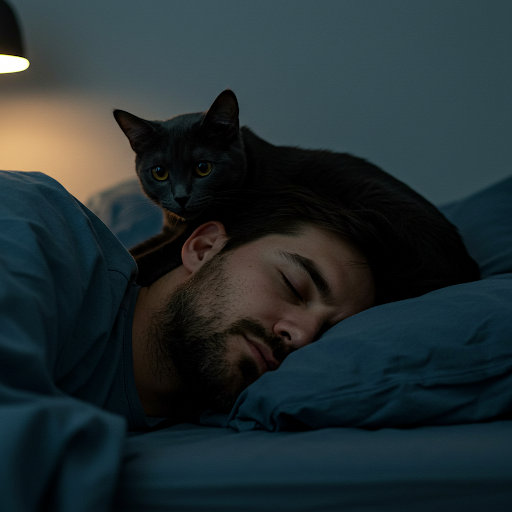
With fresh insights into why your cat indulges in bedtime snuggles atop your head, revel in the companionship crafted between you. Reward your feline’s warmth and trust with participation in their distinguished sleeping rituals. Cats bring warmth and mystery to everyday solitudes through boundless cuddles. Cherish this nocturnal routine as an emblem of shared affection and comfort.

